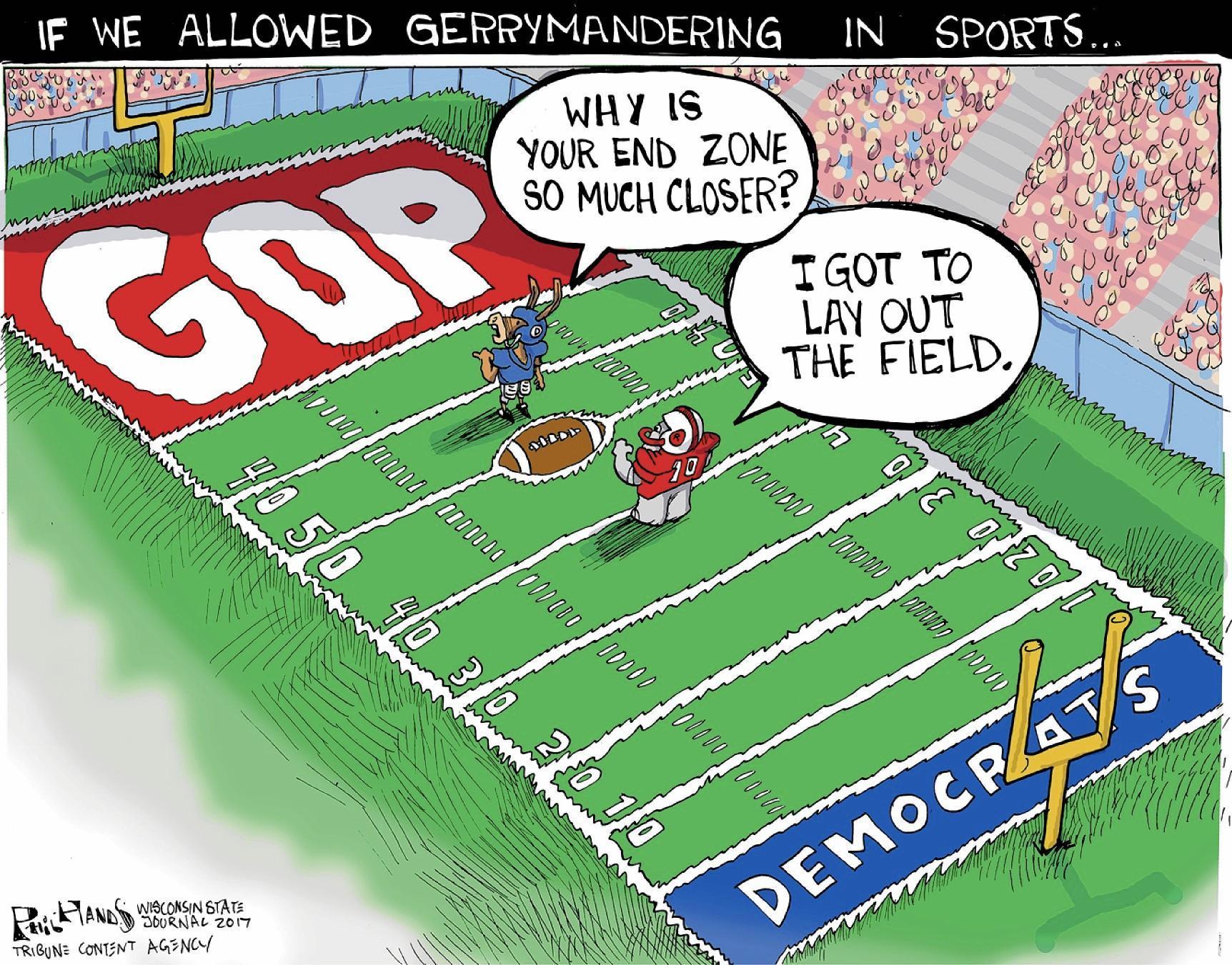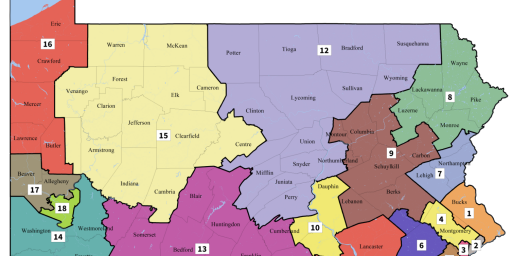Unilateral Disarmament on Gerrymandering
Democrats and Republicans are playing by different rules.

The Bulwark’s Jonathan Last argues that Democrats are hurting themselves, and ultimately American democracy itself, by holding itself to different rules than Republicans on drawing Congressional districts.
Gerrymandering is poisoning our democracy by making it harder for voters to hold their representatives accountable and pushing both parties out to the extreme. (When districts become “safe,” the balance of power in primary contests shifts away from the center.)
Both parties participate in gerrymandering. But not equally. And one party has been making a good faith effort to try to roll gerrymandering back, while the other party has been leaning into it.
He cites a tweet by Cook Political Report’s Dave Wasserman
that, in turn, cites a September AP report headlined “Democrats see consequences from redistricting reform push.”
Democrats argue that the once-a-decade process of redrawing political maps shouldn’t be a partisan cage match. In the name of good government and balance, they’ve pushed for independent commissions to do the work of rebalancing population changes into congressional districts.
They’re about to feel the consequences of their focus on fairness.
In Democratic-controlled Colorado, Virginia and Oregon, new congressional maps drawn by commissions or bipartisan power-sharing agreements are unlikely to give the party the sort of political advantages it could have otherwise enjoyed.
Republicans, meanwhile, haven’t given up their power, controlling the process in 20 states, including Florida, Texas and North Carolina.
The imbalance could come with major consequences. Democrats currently control the House of Representatives by just an eight-seat margin. Choosing not to seize advantages in redistricting could cost Democrats the House.
“There should be concern within the Democratic Party that we may have been too quick to seek reform without really looking at the long-term implications,” said Rick Ridder, a Democratic strategist in Denver.
This year, commissions will draw 95 congressional seats that otherwise would have been drawn solely by Democrats and only 13 that would have been drawn by Republicans.
My strong preference would be for bipartisan commissions to draw district lines that are based as much as possible on natural communities rather than naked partisan advantage or incumbent protection. But it makes no sense for one of two political parties to play the game that way while the other is doing everything the law will allow to gain an advantage.
Last observes,
Look, I don’t want to get out over my skis here—and again, Democrats have not been total angels—but election reform should not be a suicide pact.
Is it bad that Dems are “giving up” some seats by not pursuing gerrymandered districts? No! It’s actually good! This is what we want from our political parties.
But while unilateral disarmament can, theoretically, be part of a peaceful solution to conflict, it can also be a provocation.
The AP report gives more context for the “Democrats have not been total angels” caveat:
To be sure, not all Democratic states have sacrificed power for reform. Democratic-controlled states like Illinois and Maryland are heavily gerrymandered. And Democratic-controlled state legislatures can overrule commissions in New Mexico and especially New York, where the party could erase several GOP House seats if it controls the map.
Still, in the main, unilateral disarmament is the norm:
But given the narrow margins, the commission states matter. In Colorado, where President Joe Biden won by 13 percentage points last year, the nonpartisan commission released a preliminary map on Friday which could lead the two parties to evenly split the state’s eight congressional seats. In contrast, some Democratic maps split 6-2 in their favor. The difference, a net of four congressional seats, is half the current Democratic margin in the House.
In Virginia, where Democrats control the legislature and hold the governor’s office, party leaders are worried the bipartisan commission could deadlock, kicking control of redistricting to the state Supreme Court, dominated by GOP-appointed judges. The court would likely hire experts to draw the maps determining the political composition of the state’s 11 congressional districts and its state legislative seats.
And in Oregon, a solidly blue state that is gaining a congressional seat, the Democrats who control a supermajority in the state legislature agreed to evenly divide their redistricting committee between Democrats and Republicans.
As a Virginia resident for almost two decades now, I’ve seen us go from pretty solidly red to a bluish purple. But a confluence of events has a state that went for Biden by 10 points and re-elected Democrat Mark Warner by 12 points last November with turn around and elect a Republican governor, lieutenant governor, and statehouse a year later. The previous Democratic leadership pushed through the ballot initiative for the districting commission but it was unable to come to terms and we could wind up with Republicans drawing the map.
While the House of Representatives, the only national body impacted by the gerrymander, ostensibly serves local interests, the trend in recent decades toward parliamentary-style discipline means that Massachusetts Democrats and Alabama Democrats vote the same way. Republicans already have a built-in advantage in the Senate and a modest one in the House. But Republicans leveraging all the tools at their disposal to gain additional seats while Democrats opt for fairness stacks the deck even further.






It won’t happen, because of the Democrats’ quixotic Bidenism, but I think New York, California, and Oregon should gerrymander the pure shit out of their Congressional districts. It’s a matter of saving the country.
Dear DEMs,
Don’t bring a knife to a gunfight.
Sincerely yours, a DEM voter.
I kind of feel like two wrongs don’t make a right. Yeah, we should seek bargaining leverage, or some political process to change things.
I favor a more direct approach. Put issues on the ballot in state races. Keep doing it. Propose that any election be it for a state legislature or US Congress that has the seats allocated in a proportion bigger than X percentage points than the votes cast demonstrate that the districts are poorly done and must be redrawn before the next election, or the credentials of those elected will be invalid.
I think 5 is a good X here, but I haven’t looked at the numbers.
The point would to be to put Republicans on the defensive with this. Given comments in prior threads, it seems some fairly red states still have voters who think this is a basic fairness issue. Keep the heat on, keep the spotlight on this. It’s the core idea of democracy.
As for those blue states, we shouldn’t be moaning about it, we should be proud of it. I think every vote should count. I live in CA. That doesn’t make me dumb, that makes me a patriotic American, who believes in the principles of the Declaration of Independence and the Constitution, and puts them into practice. If you don’t think that basic democratic fairness is important, then you are an enemy of America.
This won’t work on politicians, especially the Trumpist kind, but it will work with voters.
@Bruce Henry:
Oregon did (the Princeton Gerrymandering Project gave them an F on partisan fairness). New York and California’s state constitutions include a bipartisan/semi-nonpartisan redistricting commission. I suspect that most of the people here were in favor of those commissions back in the day when they were created.
Yeah, we did that here. Passed an election reform law, including a non partisan redistricting commission. The GOPs gutted it with their own ballot issue.
Just as a point of fact, here in Colorado the commissions we have weren’t a product of Democrats’ “disarming.”
The amendments (one amendment covered congressional redistricting, the other covered state redistricting) that were put on the ballot by the divided legislature were passed unanimously – Republicans controlled the state Senate and Democrats controlled the state House and governorship at that time. Both amendments passed in 2018 with over 70% support from the people of Colorado.
Now that the landscape has shifted bluer here I can understand that some Democrats, with 20/20 hindsight, now wish the commissions didn’t exist. But it’s simply not the case in Colorado that Democrats supported creating the commissions and Republicans didn’t.
@OzarkHillbilly:
Yeah. I remember you saying that. Here’s how I’m feeling: Do it again. Point out it didn’t work. Name names. Stick to your guns, as my Mom would say.
I don’t know how a guy like me could get something like this started. All I know is how to post things here. So that’s what I’m doing. I don’t know what you can do about it, I’m sure you know better than I. So figure it out and do that. When you think of something else to do, do it.
It is super, super easy to get discouraged about this, throw up your hands, talk about “weak Dems” or “Evil Reps” and so on. Keeping the problem in front of you even when you don’t know what to do is the hard thing. It’s what they are counting on you to not do. I have to do this in some more personal areas of my life. It’s hard for me. I know it’s hard. But we need it.
@Jay L Gischer:
Side bar to say that I very much appreciate your comments on this blog.
Substance, tone, AND fair play. A rare combination.
@Michael Cain:
Still am. The solution to the problem is better voters and candidates. Neither of these things appear to be on the horizon. Still, 300 or so years (by the time the complete collapse comes) is not bad for a modern nation.
Part of the problem is that there is no such thing as a bipartisan commission: the partisans just try to get on the commissions and resume the gerrymandering there, leading to situations Arizona and Colorado where supposedly independent commissions are still creating Republican skewed maps in blue leaning states.
The only way to get rid of gerrymandering is to eliminate single member districts in favor of multi-member at large districts.
You could draw a beautiful map for Illinois, where every district would have a slice of Chicago spreading out in a sunburst pattern, and the state’s D+20 voting would ensure there isn’t a single Republican representative — each district would be a perfect representation of the state.
No one is seriously proposing that map, but I think they should do it.
It would also be so egregious that the Supreme Court would have to step in, even though they said partisan gerrymandering was fine. Effectively disenfranchising white Republicans? They care about that.
Just because the other person is being asshole does not mean you should be an asshole too.
If Ds start behaving like Rs routinely I will stop voting for them too.
Justice and fairness are core principles. This is not negotiable.
If Ds become end justify the means dicks I would be so gone and criticize them for it.
I want a just system and society. I do not want Ds to win at any cost by tipping the scales even if they are my preferred dudes. That would be unacceptable. Tyranny is tyranny. Nope.
@de stijl:
Part of how you get to justice and fairness is to make the other side want to get there. Treat them as they treat you, build out test cases, set up a situation where they want to come to the table to find a solution that everyone can agree to.
@Michael Cain:
Yeah, my old contacts on the legislative staff told me that the General Assembly members of both parties were terrified that if they didn’t do something, a commission would be done by ballot initiative that might cut the legislature out of most of the process of selecting members.
I was quite disappointed by the commission’s results for Congressional districts. So far as I can tell, the primary aim was to keep all seven of the current Representatives in the same districts, and make each of those seats a bit safer. The new eighth district will probably play out like the seventh, competitive at first, then solidly Democratic as the population continues to grow.
@Gustopher:
Don’t ask me to act like Rs are doing now. I won’t.
@Michael Cain:
I think they did OK. Given our geography, there are a limited number of ways to slice the pie while adhering to the factors they’re supposed to follow.
Oregon Democrats, with majorities in both the Oregon House and Senate, did not share power with the Republicans when drawing the lines for their own seats and for the Congressional seats. The so-called “power sharing arrangement” was mythical from the outset and then was expressly repudiated by the Democrats before the lines were drawn. The lines drawn by the Democrats were not a terrible gerrymander, however, as it is very hard for Democrats to gerrymander districts, when their supporters are concentrated in a few urban areas (mainly Portland).